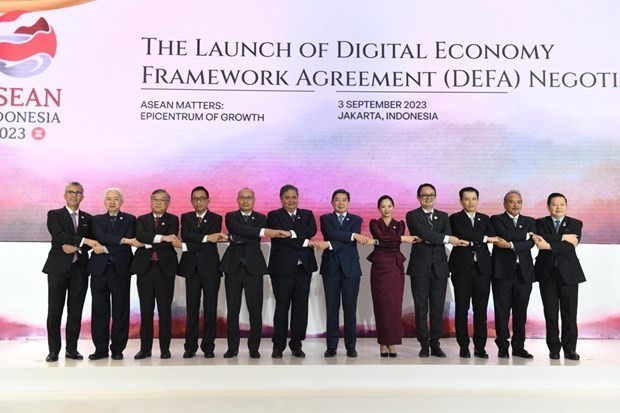Tổng số bài đăng 465.
Indonesia has succeeded in persuading ASEAN leaders to sign a digital economy agreement. The digital economy is one of the priority issues during the ASEAN Chairmanship in 2023.

The Framework Agreement on the Digital Economy (DEFA) marks the commitment of ASEAN members to promote economic growth. DEFA aims to harmonize regulations among ASEAN members on digital economy development by 2025. The ASEAN digital economy is estimated to grow to US$1 trillion by 2030.
This trend is expected to continue along with the growth of e-commerce, e-banking and e-education in ASEAN. As the 2023 ASEAN chair, Indonesia believes that the adoption of digital innovation needs to be strengthened to support the creative economy and small and medium-sized enterprises (SMEs).
Moreover, the World Economic Forum predicts that technological transformation will lead to the displacement of 75 million jobs and 133 million new jobs by 2024. The total population of ASEAN will reach 669 million people by 2023, equivalent to 8.34% of the world's population, and 440 million people in ASEAN use the Internet, further contributing to digital economic growth.
This growth will bring many opportunities in the fields of industry, economy and trade, human resource development and capacity building. Based on data from Bain & Co, Indonesia's digital economy has reached a value of $70 billion and is predicted to more than double to $146 billion in the next two years. The digital economy was strengthened by the pandemic, which caused e-commerce in ASEAN to grow by 63%.
It will continue to consolidate and grow with the introduction of more e-commerce, e-banking, and e-education activities. Most ASEAN countries remain committed to improving digital infrastructure. In 2022, there are 7 ASEAN countries occupying positions on the global average index for digital infrastructure.
Some countries in the Asia Pacific region are already quite advanced in terms of digitization, such as Singapore and Malaysia. This can be an incentive for other ASEAN countries to continue to improve digital infrastructure development to create ASEAN digital connectivity.
However, the rapid growth of the digital economy in recent years poses significant challenges for ASEAN, including geopolitical dynamics, weak regulatory frameworks, investment needs, and the digital divide. Geopolitical issues make it difficult to implement digital connectivity.
For example, the situation in Myanmar has caused unfavorable conditions among ASEAN member states. In addition, tensions in the South China Sea involving some ASEAN countries also directly affect digital connectivity. The decoupling process forces ASEAN member states to make choices while developing digital infrastructure. Some ASEAN member states have weak legal positions in terms of regulations. Only Thailand, Vietnam and the Philippines have coordinated laws, strategies and systems related to cybercrime. Indonesia, Myanmar, Cambodia and Brunei Darussalam have only interagency coordination systems.
Meanwhile, investment in the telecom sector remains low in ASEAN except for Singapore, where digital investment is boosted. This lack of investment makes community participation in everyday digital activity low.
According to the ASEAN Digital Generation Report released in 2022, only 21% of ASEAN's population uses digital services such as credit, investment, and insurance. Digital connectivity depends on education, skills and infrastructure, and levels of digital readiness vary widely.
In ASEAN, there are notable gaps in internet access, penetration and skills. According to global digital skills rankings, Singapore, Brunei, Malaysia and Indonesia are more advanced than other countries. In the face of such challenges, ASEAN needs to take a step further to promote digital connectivity. In addition, the signed framework needs to be implemented into concrete action. From a legal point of view, every country must have a solid legal foothold.
Harmonizing global principles and frameworks, including data governance and artificial intelligence (AI) as well as cross-border payment systems, is essential to advancing the digital economy. To overcome differences in the level of technological development and internet access among ASEAN countries, raising ASEAN's digital level must be a top priority.
To address this issue, each country should share its best practices. As ASEAN acknowledges through its human-centred principle, the involvement of private entities is essential to help governments invest in and develop human capital by leveraging digitalisation in all sectors including governance, health and education.
To predict future cybercrime and the advancement of AI use, ASEAN countries are encouraged to adapt their regulations and develop a single regional framework.
The 2023 Chairmanship has reaffirmed ASEAN's position and commitment to being the epicenter of growth. At this level, Indonesia, as ASEAN's most populous country and largest economy, can bring many opportunities to ASEAN through promoting digital transformation.









